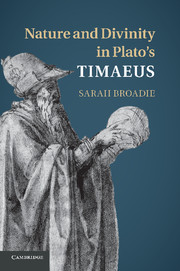Book contents
- Frontmatter
- Contents
- Acknowledgements
- What lies ahead
- Chapter 1 The separateness of the Demiurge
- Chapter 2 Paradigms and epistemic possibilities
- Chapter 3 The metaphysics of the paradigm
- Chapter 4 Immortal intellect under mortal conditions
- Chapter 5 The Timaeus–Critias complex
- Chapter 6 The genesis of the four elements
- Chapter 7 Divine and natural causation
- In conclusion
- Appendix on ‘parts of the paradigm’
- References
- General index
- Index locorum
What lies ahead
Published online by Cambridge University Press: 05 December 2011
- Frontmatter
- Contents
- Acknowledgements
- What lies ahead
- Chapter 1 The separateness of the Demiurge
- Chapter 2 Paradigms and epistemic possibilities
- Chapter 3 The metaphysics of the paradigm
- Chapter 4 Immortal intellect under mortal conditions
- Chapter 5 The Timaeus–Critias complex
- Chapter 6 The genesis of the four elements
- Chapter 7 Divine and natural causation
- In conclusion
- Appendix on ‘parts of the paradigm’
- References
- General index
- Index locorum
Summary
To introduce the Timaeus briefly, I cannot do better than quote an excellent summary by R. B. Rutherford:
The Timaeus falls into three main parts, the first two of which are continuous. The first is an introductory exchange in which Socrates greets three friends – Timaeus, Critias and Hermocrates – and recalls how they met the previous day and considered in theoretical terms the social and economic structure of an ideal society: there are clear reminiscences of the Republic, but it is also obvious that much that was essential to that society is ignored. Socrates expresses the desire to see this ideal state in action, and the second part of the dialogue consists of a speech by Critias in which he declares that such a society can in fact be exemplified in early Athenian history, known from records of a forgotten age which were found by his ancestor Solon in Egypt. He whets the appetite of the company with the beginnings of his narrative, which will narrate the great war between Athens and the lost island of Atlantis; this topic, however, is deferred to the Critias, already anticipated as the second work of a trilogy. Today, Timaeus, represented as a Pythagorean from Italian Locri, will give an exposition of something older and perhaps more magnificent – an account of the creation of the universe. Timaeus’ speech occupies the third and by far the longest part of the work, and can be further subdivided into sections. In brief, it describes the shape and structure of the cosmos, narrates in ‘mythical’ form the deliberate designing of it and all that it contains by a divine ‘demiurge’ (craftsman), and proceeds to describe in some detail its motion, its elements, the stars and planets (conceived as divine), and the living creatures, above all man, which have been created to inhabit the earth, placed at its centre.
And:
The main speech in the Timaeus embraces an extraordinary range of subject matter and style, ranging from macrocosm to microcosm, from the cosmically great to the clinically minute: an example of the former might be the passage describing Time as the likeness or mirror-image of Eternity (37c–8c), of the latter the bizarrely technical discussion of the process of taste (e.g. 65b–6c). In this speech Plato draws on many fields which were evolving their own specialised vocabularies: mathematical astronomy, medicine, music, metallurgy to name but a few.
Plato through the character Timaeus presents our rich, complex, and fascinating universe as having an origin beyond itself. We are to think of the physical cosmos as made by a divine incorporeal intelligence in accordance with an eternal, incorporeal, intelligible paradigm. Although the cosmos is Timaeus’s focus and his object of study, we are never allowed to lose sight of what for him is the foundational fact about it, namely its trans-natural origin. Within this framework he offers an explanation not only of how the world-order came to be and what that order consists in, but also of how we humans can reasonably hope to speculate about cosmological questions. He gives an account, too, of the existential position of human beings. He shows how they are (of course) embedded in the physical world, but also how there is more to human rational selves than that. He therefore has to show how these come to be in the physical world.
- Type
- Chapter
- Information
- Nature and Divinity in Plato's Timaeus , pp. 1 - 6Publisher: Cambridge University PressPrint publication year: 2011



